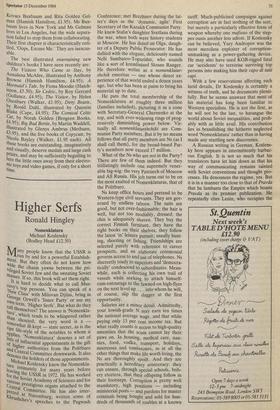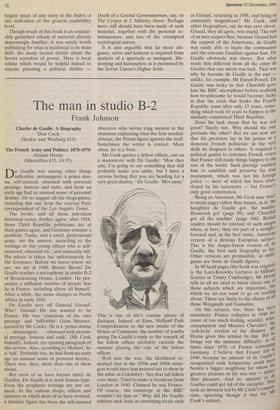Higher Serfs
Ronald Hingley
Nomenklatura Michael Koslensky (Bodley Head £12.50)
Many people know that the USSR is run by and for a powerful Establish- ment. But they often do not know how Wide the chasm yawns between the pri- vileged Soviet few and the sweating Soviet Masses. If so, this book will set them right. It is hard to decide what to call Mus- covY's top persons. You can speak of a ',New Class' with Milovan Djilas, bring in George Orwell's 'Inner Party' or use my Own term, 'Higher Serfs'. But what do they call themselves? The answer is `Nomenkla- tura', which tends to be whispered rather than shouted; the very word is a — somewhat ill-kept — state secret, as is the ripe life-style of the notables to whom it art:Plies. `Nomenklatura' denotes a set of Ts of influential appointments in the gift (21' higher authorities from the Politburo a,nd Central Committee downwards. It also denotes the holders of those appointments. t Michael Koslensky knew the Nomenkla- lara intimately for many years before ceaving the USSR in 1972. He has worked vtor the soviet _aer jells Academy of Sciences and for
Prestigious organs attached to the ntral
Zeted Committee. He has also inter- r, n at Nuremburg; written some of ushchev's speeches to the Pugwash Conference; met Brezhnev during the lat- ter's days as the 'dynamic, agile' First Secretary of the Kazakh Communist Party. He knew Stalin's daughter Svetlana during the war, when both were history students at Moscow. He has dated an Olga, daugh- ter of a Deputy Public Prosecutor. He has dallied with the elegant, deliciously named Nelli Sumbatov-Topuridze, who sounds like a sort of kremlinised Sloane Ranger. He therefore writes as a nomenklatur- shchik emeritus — one whose direct ex- perience of that world ended a dozen years ago, but who has been at pains to bring his material up to date.
He puts the total membership of the Nomenklatura at roughly three million (families included), picturing it as a cone with Secretary-General Chernenko at the top, and with ever-widening rings of prog- ressively diminishing power below. Vir- tually all nomenklaturshchiki are Com- munist Party members. But it by no means follows that all party members are Ns (as I shall call them), for the broad-based Par- ty's members now exceed 17 million.
What of the Ns who are not in the Party? There are few of them indeed. But they titillatingly include one supremely vener- able big-wig: the very Patriarch of Moscow and All Russia. His job turns out to be on the most exalted of Nomenklaturas, that of the Politburo.
Ns keep office hours and pretend to be Western-type civil servants. They are gov- erned by endless taboos. The suits are good, but not over-fashionable; the hair is well, but not too modishly, dressed; the chin is adequately shaven. They buy the correct Finnish furniture, they have the right books on their shelves, they follow the latest 'in' leisure pursuit; usually hunt- ing, shooting or fishing. Friendships are selected purely with reference to career prospects, and an elaborate ceremonial governs access to and use of telephones. Ns discreetly toady to superiors and 'democra- tically' condescend to subordinates. Mean- while, each is collecting his own trail of vassals while seeking to attach himself- cum-entourage to the fawned-on high-flyer on the next level up. . . into whom he will, of course, slip the dagger at the first opportunity.
Salaries are a minor detail. Admittedly, your lowish-grade N may earn ten times the national average wage, and that while paying only 13 per cent income tax. But what really counts is access to high-quality amenities that the scum cannot lay their paws on. In housing, medical care, nan- nies, food, vodka, transport, holidays, mistresses and tombstones, as in all the other things that make life worth living, the Ns are thoroughly spoilt. And they are practically a hereditary aristocracy: they can ensure, through special schools, brib- ery etcetera, that their offspring follow in their footsteps. Corruption is pretty well mandatory, high positions — including ministerial posts — and pardons for master criminals being bought and sold for hun- dreds of thousands of roubles at a known tariff. Much-publicised campaigns against corruption are in fact nothing of the sort, but merely a particularly effective form of weapon whereby one mafioso of the step- pes ousts another less adroit. If Koslensky can be believed, Yury Andropov was the most merciless exploiter of corruption- unmasking as a power-gathering device. He may also have used KGB-rigged fatal car 'accidents' to terrorise surviving top persons into making him their capo di tutti capi.
With a few reservations affecting such lurid details, Dr Koslensky is certainly a witness of truth, and he documents plenti- fully. But he seems unaware that most of his material has long been familiar to Western specialists. He is not the first, as he will not be the last, to harangue the world about Soviet inequalities, and prob- ably with as little avail. His contribution lies in brandishing the hitherto neglected word `Nomenklatura' rather than in having made any startling new discoveries.
A Russian writing in German, Koslens- ky here appears in intermittently barbar- ous English. It is not so much that his translators have let him down as that his way of communicating remains tainted with Soviet conventions and thought pro- cesses. He denounces the regime, yes. But it is in a manner too close to that of Pravda that he lambasts the Empire which boasts Pravda as its premier publication. He repeatedly cites Lenin, who occupies the largest space of any entry in the Index: a fair indication of the general readability level.
Though much of this book is an unpalat- ably garnished rehash of material already depressingly familiar, it was surely worth publishing for what is incidental to its main drift: the many factual details about the Soviet corridors of power. Here is local colour which would be helpful indeed to anyone planning a political thriller — Death of a Central Committeeman, say, or The Corpse at 5 Nikitsky Street. Perhaps more still should have been made of such material, together with the personal re- miniscences, and less of the attempted sociological survey.
It is also arguable that far more ele- gance, verve and humour is required from analysts of a spectacle as inelegant, life- denying and humourless as is presented by the Soviet Union's Higher Serfs.



















































 Previous page
Previous page